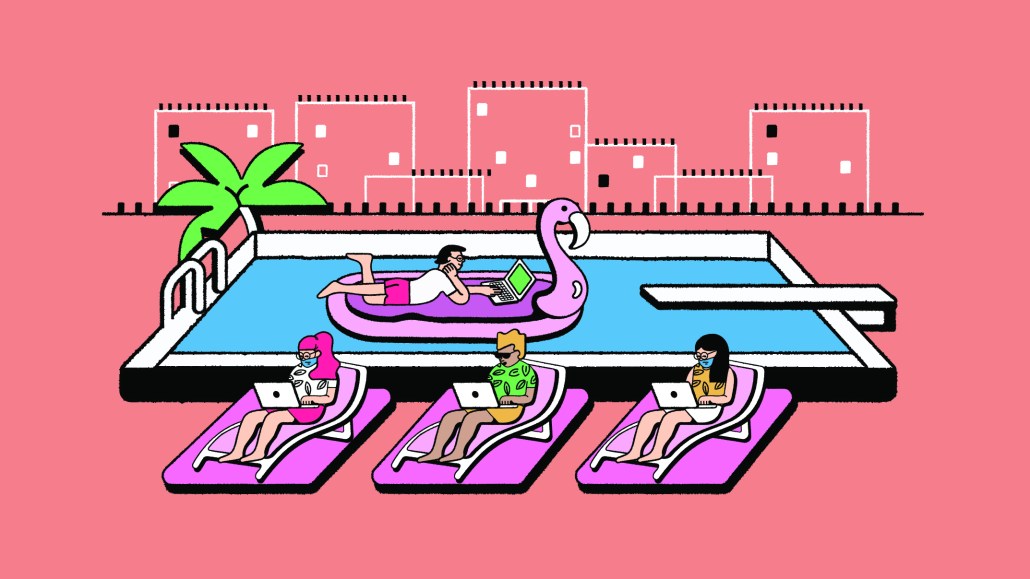Secure your place at the Digiday Media Buying Summit in Nashville, March 2-4
‘A breath of fresh air’: Outdoor workspaces are having a post-pandemic moment

Outdoor workspaces have long been standard at creative and tech firms, from Microsoft’s tricked-out treehouses to Shutterstock’s birds-eye perch atop the Empire State Building. In the thick of the pandemic, fears about working in close quarters had plenty of companies emphasizing their fresh-air digs.
With the pandemic ebbing and the return to the office now underway, companies continue to promote the great outdoors — if a glam, WiFi-enabled one — as a must-have feature of the post-COVID workplace, one that’s got employees’ feelings around safety, comfort and creative inspiration top of mind.
At its massive new mixed-use development on Manhattan’s westside, the global real estate giant Related Companies has teamed with the coworking firm Industrious on a project called Yard Work at Hudson Yards, a 7-acre outdoor meeting and workspace providing custom accommodations for up to 28 people. Features include swing set-style seating and sound-buffered work pods that seat four apiece. The area is also equipped with high-speed internet, tech-charging stations, free access to The New York Times, food delivery and an onsite attendant.
And yes, reservations are required.
In its first week of operation in late June, Yard Work took some 100 bookings through mid-August, according to Related’s president Philippe Visser. “When we started planning for tenants returning as COVID receded, we went through a range of options we thought would get them excited to come back to cities and come back to the office,” Visser said. Those who use the space can “enjoy the weather and have business meetings outside, and maybe top off with a cocktail,” he added.
One of the most ambitious real-estate developments in New York in decades, Hudson Yards is the home base of companies like WarnerMedia, SAP and L’Oréal USA. Visser said Yard Work is an idea that could be transported to other mixed-use properties belonging to Related, including Rosemary Square in West Palm Beach and Kings Cross in London. The U.K. may well be seeing still more institutional outdoor spaces as the parent of the department store chain John Lewis and Waitrose supermarkets announced it would convert flagging retail locations into as many as 10,000 residential units over the next decade.
Clearly, the outdoor workspace is an idea whose time has come in a post-pandemic world.
“Public spaces inspire people every day, and inspire them to do their best work,” Visser said. “People have been locked up during COVID and are starved for human interaction. This is literally a breath of fresh air.”
The outdoor workspace is “definitely here to stay,” added Ebbie Wisecarver, WeWork’s global head of design. “Working outside can increase productivity and happiness, [while] providing access to outdoor spaces is an excellent way for employers to create a more flexible, welcoming environment for their employees when they return to the office,” she said. More than 200 WeWork locations around the world — including those in Paris, Austin and Monterrey, Mexico — feature outdoor accommodations.
In preparing for the return of its employees, Durham, North Carolina-based McKinney is among the ad agencies reimagining its offices, including the retooling of its outdoor spaces, said CEO Joe Maglio. Two decks have been transformed into collaborative work areas, equipped with new furniture, flatscreens and videoconference technology. Building out spaces beyond the confines of a conference room “will allow people to work together while feeling comfortable as everyone readjusts to being in person,” he said.
Daren Bascome, founder and creative director of Proverb, a Boston-based agency that specializes in designing and branding destinations — including corporate headquarters, hotels and apartment buildings — suggested that as businesses begin to open back up, they have to make themselves more inviting to the people passing through their doors. Outdoor spaces can be “showstoppers,” and as such are a “tremendous opportunity to brand a workplace,” he said.
Bascome advises companies that want to transform their outdoor spaces to think of a variety of sensual considerations — everything from minimizing the sounds of the city with top-of-the-line speakers and a soundtrack that speaks to the image and mood the company wishes to convey to the design of seating and lighting. Companies may also want to set up outdoor spaces to accommodate a number of different functions: take one of Proverb’s clients, which recreated its rooftop not only as a workspace but also for hosting team-building exercises and entertaining clients.
And if a company doesn’t have the luxury of a patio or roof deck? Bascome said more of his clients are bringing the outdoors indoors, incorporating features like plants and natural light.
“We spend at least one-third of our lives working,” he said. “Your office can be so much more than just a container for your work routines — and it should be, considering the investment most companies make in it.”
More in Marketing

Pitch deck: Why Amazon believes its premium streaming inventory is worth the money
Amazon is pitching its DSP to make the case.

In Graphic Detail: The state of the marketing agency sector
Revenue figures from Omnicom, Publicis and Havas, and new employment stats, offer a snapshot on a quickly evolving industry.

Future of Marketing Briefing: The mental gymnastics of principal media
Welcome to the psychological CrossFit class of modern marketing. Here’s how marketers are learning to move through it.








